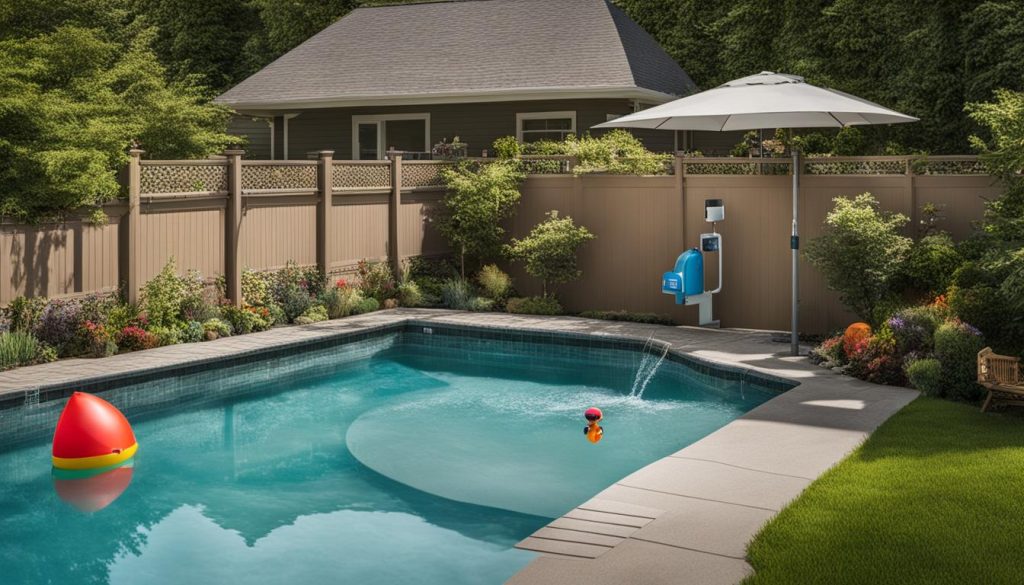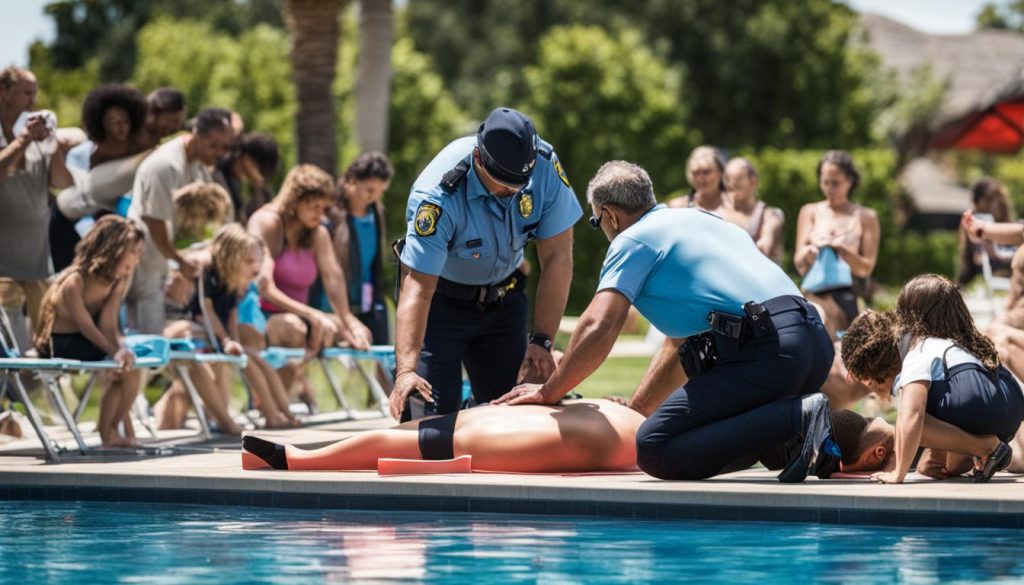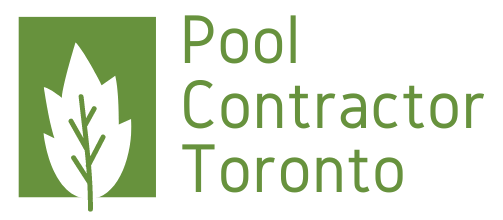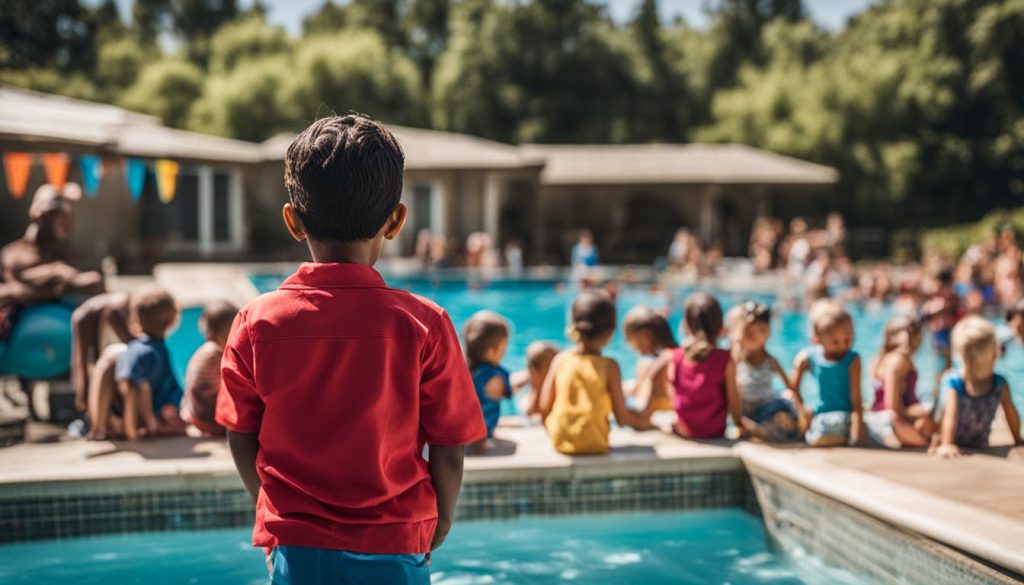Welcome to our guide on pool safety tips, designed to help you protect your family and friends while enjoying a joyous swim time in your pool. As a pool owner in Canada, it is essential to understand the risks and take necessary precautions to avoid accidents and potential hazards.
Our comprehensive guide covers the top pool safety tips that every pool owner should know, from ensuring proper adult supervision to regular maintenance and inspections. By following these tips, you can create a safer environment for everyone, making pool time an enjoyable experience for all.
We understand that your family’s safety and well-being are of utmost priority, and we are here to guide you through the process of ensuring that your pool is a safe and secure place. Let’s dive in and learn about the pool safety measures you can take to protect your loved ones!
Ensure Proper Adult Supervision
When it comes to pool safety, adult supervision is the most crucial factor. We cannot stress enough how important it is to have a responsible adult present at all times while children or inexperienced swimmers are in or around the pool area. According to the Lifesaving Society Canada, 85% of drowning deaths of children aged 0-4 occur when they have access to a pool without adult supervision.
Designate a person to watch over the pool, with no distractions such as browsing through their phones, or socializing with other adults. Rotate this duty amongst adults present; it will ensure that one person is always alert and not getting tired. If there is no adult available to supervise, make sure the pool is covered or locked to prevent unauthorized access.
How to ensure proper adult supervision:
- Designate a responsible adult to watch over the pool
- Ensure that the person is free from any distractions and capable of supervising
- Rotate the duty among adults present, so no one gets tired
- Consider hiring a professional lifeguard for larger groups of people or special events
Prevention is always better than cure, and by ensuring proper adult supervision, we can prevent accidents and drowning incidents. Remember, we are responsible for the safety of our family and anyone who uses our pool. So, let’s take this responsibility seriously and ensure a safe, enjoyable, and accident-free swim time.
Install Pool Safety Barriers and Alarms
When it comes to pool safety, installing pool safety barriers and alarms is a must. These measures will help prevent unauthorized access to the pool area, which can significantly reduce the risk of accidents and drowning incidents.

Pool safety barriers, such as fences, gates, and pool covers, can make it difficult for children and pets to enter the pool area without supervision. Remember to install pool barriers that meet your area’s regulations and standards. It is also essential to consider installing alarms that can alert you when someone enters the pool area without permission. This will provide additional protection and give you peace of mind.
Some pool alarms can sound when someone falls into the pool, while others will alert you when the pool gate is opened or the pool cover is removed. There are several options available, so choose the one that suits your needs and budget.
We recommend that you regularly check your pool barriers and alarms to ensure they are in good working condition and replace them if necessary. Faulty safety equipment can put your family and friends at risk.
Learn CPR and First Aid
In an emergency, every second counts. That’s why learning CPR and first aid techniques specifically for water-related accidents is vital for pool safety. CPR, or cardiopulmonary resuscitation, is a life-saving technique that can be used to help someone who has stopped breathing or whose heart has stopped. First aid skills also come in handy when responding to pool accidents and injuries.
By learning these skills, we can be prepared to provide immediate assistance in case of an emergency until professional help arrives. It’s essential to keep a first aid kit handy near the pool area to ensure that the necessary supplies are readily available in case of an emergency.
Knowing CPR and first aid will give us the confidence to act quickly and effectively in an emergency, potentially saving a life.

Conclusion
In conclusion, knowing CPR and first aid, and having a first aid kit nearby, are crucial for pool safety. We can’t predict accidents, but we can be prepared to act quickly and effectively to help others in need.
Regular Maintenance and Inspections
Keeping your pool well-maintained is crucial for ensuring pool safety. Regular pool maintenance involves cleaning the pool, checking the water chemistry, and ensuring the pool equipment is functioning correctly.
Regular inspections of your pool and equipment are also essential to identify any potential hazards and address them promptly. You should inspect your pool and equipment at least once a month and perform repairs or replacements as needed.
Pool Maintenance
The pool water should be chemically balanced, and the pool should be kept clean at all times to ensure it is safe for swimming. You should clean your pool at least once a week to remove any debris, such as leaves and dirt. Additionally, ensure that the filter and pump are working correctly and clean them regularly.
You should also check the pool water chemistry at least once a week using a water testing kit. This will help you balance the chemicals in the water to ensure it is safe for swimming. If you notice any issues, such as cloudy water or an unusual smell, take immediate action to resolve them.
Pool Inspections
Regular inspections of your pool and equipment can help identify potential hazards and address them promptly. During inspections, you should check for any damages or leaks in the pool and equipment. Additionally, ensure that all safety equipment, such as lifebuoys and rescue hooks, are in proper working condition.
Inspect the pool area and ensure that there are no tripping hazards. The pool deck should be clean and free of any obstacles. Additionally, ensure that any pool toys or floats are safe and in good condition.
Equipment Safety
Pool equipment, such as the filter, pump, and heater, should be checked regularly to ensure they are functioning correctly. Inspect the equipment for any signs of wear and tear or damage, such as cracks or corrosion, and repair or replace as needed.
Ensure that any electrical equipment is properly grounded and away from the pool area to prevent the risk of electrical shock. Additionally, ensure that the pool cover is in good condition and free of any tears or holes that could allow a person to fall into the water.
By following these pool safety tips, you can ensure the safety of your family and friends while enjoying a worry-free swim time in your pool. Regular maintenance and inspections, coupled with proper cleaning and chemical balancing, will go a long way in keeping your pool safe and enjoyable.
Our support team is at your service around the clock, ensuring that none of your questions go unanswered. Should you have any inquiries, please don’t hesitate to call us at (647) 891-0462.
FAQ
What are some essential pool safety tips for pool owners?
Pool owners should ensure proper adult supervision, install pool safety barriers and alarms, learn CPR and first aid, and conduct regular maintenance and inspections on their pools and equipment.
Why is adult supervision important for pool safety?
Proper adult supervision at all times reduces the risk of accidents and drowning incidents, especially for children or inexperienced swimmers.
What pool safety barriers and alarms should I consider installing?
Pool owners should install fences, gates, and pool covers to prevent unauthorized access. Additionally, alarms that alert you when someone enters the pool area without permission can provide added safety.
Why is it important to learn CPR and first aid for pool safety?
Being prepared with CPR and first aid skills specific to water-related accidents allows pool owners to provide immediate assistance in emergencies until professional help arrives.
What should regular maintenance and inspections involve for pool safety?
Regular maintenance includes keeping the pool clean, checking for leaks or damages, and ensuring that all safety equipment, such as lifebuoys and rescue hooks, are in proper working condition. Inspections help identify potential hazards early on.

